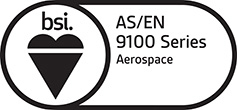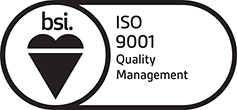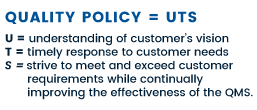On Time, Every Time
The Aviation and Defense (A&D) supply chain is a complex ecosystem comprised of different tiers of suppliers supporting both original equipment manufacturers (OEMs) as well as maintenance, repair and overhaul (MRO) providers. In the capital-intensive A&D industry, an agile and resilient supply chain, merits the highest level of attention. Effective and efficient supply chains enable A&D organizations to meet their strategic and financial goals.
Unitek offers a comprehensive portfolio of Supply Chain Management services that help companies drive more value and reduce risk across the enterprise.
Unitek’s Supply Chain Schedule Recovery services increase supplier on-time delivery (OTD) performance. Supply Chain Schedule Recovery service is a turnkey, systematic service applied to a focused portion of the customers supply chain that causes most of the shortage problems. Suppliers with unreliable delivery performance require visibility, problem solving analysis and improvement activities to correct and ensure consistent delivery performance.
Supply Chain Schedule Recovery services assess, measure and improve supplier production while providing accurate and timely status of parts on order. A broad range of engineering and management techniques are utilized, including:
- Supplier Program Management
- Subcontract Management
- Lean principles
- Capability
- Capacity and Risk Assessments
- Root Cause Analysis and Corrective Action Management
- Production Control
- Supply Chain Analysis
- sub-tier control
- Teamwork Facilitation
The aim of Supply Chain Schedule Recovery services is for suppliers to reach a performance level where on-site intervention is no longer necessary.
Depending on customer requirements as well as the complexity, maturity and quantity of parts on order, suppliers typically receive Supply Chain Schedule Recovery services for a few months before transitioning to a lower level of supply chain management service such as Expediting services.
Production monitoring tracks all aspects of production in real time as parts are being made and applied to the shop orders with schedule details, finished product counts and quality data. Production Monitoring provides rapid feedback on critical parameters such as, Order entry, material receipt, production start date, production time, downtime, scrap, rejects, total parts created and parts remaining to be produced.
Expediting is taking the action necessary to ensure that deliveries are made on time and to specification. Expediting coordinates and accelerates the flow of work and materials within or between suppliers according to production schedule, through the reviewing of production schedules, order schedules, inventory levels, work in process (WIP), and shipment schedules. Effective communication is critical with multiple supplier department supervisors on the progress of work, inventory levels, costs, and production problems, as well as critical for customers to report the progress of work, completion dates and accurate shipping schedule.
Our Expediting Services provide monitoring and follow-up on the progress of critical path tasks. Our expediters provide visibility and the assurance that production will proceed as normal and minimize the risk of unexpected or undesirable delays which could impact project deadlines.
A Supplier Capability Assessment is vital in determining the supplier’s true production capabilities for a specific product or contract. This assessment is ideal for complex products or critical path items and can be performed either pre-award or post-award.
The assessment is performed on-site at the supplier manufacturing location utilizing industry-recognized best practices. Several areas are assessed, including:
- Manufacturing & Tooling Capabilities
- Facilities Capabilities
- Inspection & Metrology Capabilities
- Human Capital Capabilities
- Other areas may be added at the customer’s request
A Capability Assessment Report is provided to the customer which includes:
- Summary of the supplier’s capabilities
- List of identified gaps & risks
- Recommendations on best practice mitigation strategies
A capacity Analysis evaluates a supplier’s ability to meet current customer demand as well as any forecasted increase, assuring quality product is delivered on time. The assessment is performed utilizing a risk evaluation approach derived from industry-recognized best practices in Quality and Supply Chain Schedule Recovery. The Capacity Assessment report provided to the customer includes a general overview of the supplier’s and capacity, identifies any applicable risks and provides best practice mitigation strategies.
(includes but not limited to):
- Production Process Overview
- Production planning
- Machinery / Tooling
- Facilities
- Personnel
- Sub-tier suppliers
- Raw materials
- Past Quality performance
- Past Delivery performance
Unitek helps customers develop a Supplier Program Plan from the ground up or make targeted improvements to underperforming areas of their existing Supplier Program Plan.
The journey begins by understanding the customer’s needs and establishing deliverables. From there, Unitek examines the customer’s current practices against the desired future state to uncover gaps and opportunities.
With actionable insights identified, Unitek develops a tailored solution that meets the customer’s needs and approval. A project plan is created that defines client deliverables along with implementation actions, owners, and due dates. A responsibility matrix of the customer’s key process owners and stakeholders is also created to foster an inclusive approach.
Implementation is then accomplished using the Six Sigma approach of Define, Measure, Analyze, Improve and Control (DMAIC). This approach is both rigorous and proven at ushering in organizational change from conception to validation that the solution had the desired results.
Customers are kept fully informed throughout the lifecycle of the project. A program manager is assigned by Unitek who meets regularly with the customer to report progress, review deliverables, and address any questions or concerns.
Unitek helps customers improve the production costs, flow, and lead-time for a specific product, production line, or an entire manufacturing facility. Key benefits include:
- Improving the quality of the final product
- Reducing cycle time to completion
- Eliminating waste
- Reducing costs
- Faster production lead-times
A systematic and proven approach is utilized drawing on tools and methods from Lean Six Sigma and Industrial Engineering disciplines. Using a 5-step framework, Unitek works with customers to plan, implement, and capture benefits:
- Establish Goals – The first step is to get clarity and alignment on the customer’s goals and the pain points and their symptoms. We then identify customer stakeholders and participants for an inclusive and collaborative approach.
- Map the Current State – During this phase, the current state of the overarching production processes are identified and mapped to show inputs, outputs, and constraints of the process.
- Identify Opportunities – Next, a physical walk of the production sequence helps visualize material movement, inventory buildup, and specialized processes / training. Optimization opportunities are identified, prioritized, and actionable recommendations are formulated.
- Make Targeted Improvements – During this phase, the prioritized recommendations are implemented. A collaborative implementation plan is developed with the customer and identifies implementation actions, owners, and due dates.
- Capture the Benefits – Once implementation actions have been completed, Unitek objectively validates the before and after results to ensure the expected business effects have been realized.
The supply chain is profuse with risks that can disrupt your operations, increase costs, and erode customer confidence. As a result, the Aerospace & Defense industry has moved to increase the operational risk management requirements within the latest revisions of AS9100.
The expectation is that organizations will proactively identify risks and take action to reduce risks down to within acceptable levels.
Unitek can help by creating, or improving, your operational risk management program that delivers business results while satisfying customer and regulatory (i.e. AS9100) requirements.
Using a 5-step framework, Unitek works with customers to plan, implement, and control their operational risk management process:
- Assign responsibilities – Who needs to be involved with risk management? If there is a cross functional team involved then which departments need to be included? If actions are likely to be assigned to a certain department or function, it is best to have them involved in the whole management process.
- Define risk assessment criteria – What will be your criteria for risk assessment? Development of the assessment criterial will normalize evaluations consistently. Ultimately, this will assist in determining what risk to accept and what risk to mitigate?
- Identify, assess, and communicate risks – Risk identification and severity analysis once complete needs to be flowed to the appropriate functional stakeholders.
- Identify, implement, and manage mitigation actions – There are many ways to address risk, and one of those methods for highly risky items is to take action to mitigate the risk – or, in other words, try to prevent the risk from happening. If a risk exceeds your risk acceptance criteria, then make plans to address the risk and track those actions.
- Accept risk that remains when mitigation is complete – Sometimes, no matter what actions you take, some risk will remain. For example, mitigation actions can be too costly or prohibitive. In these cases, accepting this risk is what needs to be done at this point. Record the remaining risk and move forward with operations.
Unitek also offers a variety of on-site supplier risk assessments (i.e. capacity risks, capability risks, quality risks, etc.) that can be deployed pre-award or post-award as needed.
Supplier performance management is an essential part of any procurement strategy. Supplier performance directly affects the quality of the entire supply chain which makes it critical in establishing an efficient mechanism to enhance it, accelerate its improvement and ensure the quality of services and products.
Since 1973, we have been a dedicated partner to OEMs and their suppliers in the aerospace, defense and other industries. Contact us today for more information on our Supply Chain Management Services.




